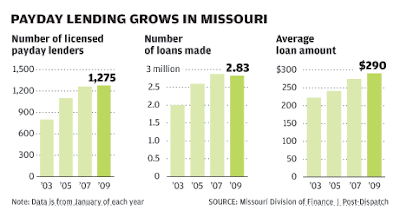In Illinois, a payday lender can provide a 14 day cash advance and make $15 per $100. The problem is that the state database limits what people can borrow and completely eliminated rollovers by a cooling off period. Under this law, the industry would take a big financial hit. Ironically, this act was supported by the large national payday chains.
The PLRA act covered loan that were less than 120 days. So lenders put away their payday hat and started operating under CILA (Consumer Installment Loan Act). This covers any lender that loans money up to $25k on a single loan.
Payday lenders began offering 120-180 day installment loans. When national payday operators started losing customers to the installment lenders, they started offering installment loans too.
The PLRA loan was way to overbearing for borrowers. People cannot stand to be treated like children.
My theory is that this 99% bill is aimed directly at payday lenders. The reason 99% works is that it does not step on the toes of the large banks like HSBC, which offer loans routinely at 36% and greater.
SB1435 is getting steam. Its passed the Senate on April 2nd and is not in the house. I find this page the best way to track a law. If you’re really bold, you can try and follow this flow chart of how a bill becomes a law in Illinois.
You can also read more about Senate bill 1435 at Progress Illinois.

